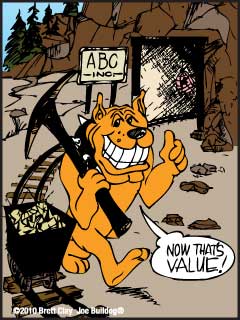Change Leadership — Secret # 65
Be A Miner, Not A Prospector
The mother lode is always below the surface.
—Brett Clay
What I Need to Know |
Many of the concepts in the Change Leadership Framework are broadly applicable, whether you are driving large-scale change in enterprise infrastructure or driving smaller-scale change as a residential real estate agent. However, Selling Change is not a book about cold-calling, qualifying opportunities, and managing a funnel of many customers. Selling Change is about maximizing the business opportunity one account at a time. Does that mean prospecting is not necessary or important? Prospecting is certainly a critical component of success in transactional and solution-oriented sales environments. But high-value change leadership requires an entirely different approach—mining for gold.
Your client’s organization is the mountain where the gold mine is located. Or, in an individual consumer context, the mountain is the person’s life. All the rocks and soil in the mountain are the company’s operations. The veins of gold that run through the mountain are sources of value. What is the value, then?
Abraham Maslow would say value is created when a need is satisfied. Kurt Lewin would say value is created when a person reaches a goal in her life space. In the Change Leadership Framework, I define value as the measure of the benefit realized by achieving a change.
What I Need to Do |
The fundamental premise of change-centric selling is that value is created by change. Your role, then, is to mine the customer’s organization or life for opportunities to change.
Contrast this with (1) transactional selling, where value is created by providing the best price and delivery terms and the salesperson’s role is to drive awareness of availability and (2) solution-oriented selling, where value is created by solving problems and the salesperson’s role is to search for problems solved by his product.
Because the only constant in life is change, change-centric selling provides a constant flow of opportunities in an account. Your job is to create those opportunities and deliver change.
Because you are delivering change, rather than products, you may find you have to detach yourself, or even divorce yourself, from your products. Notice that in doing so, you also become customer-centric and customer dependent, rather than product- or problem-centric. So, choose your customers wisely.
Action Summary |
|
 |



Social